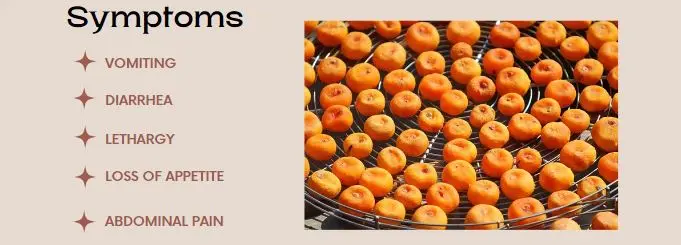Persimmons are a delicious, vitamin-rich fruit loved by people worldwide — but are they safe for dogs? If you’ve ever caught your pup eyeing your fruit bowl, you might wonder whether persimmons are a healthy treat or a hidden hazard. In this guide, we’ll break down everything dog owners need to know: the nutritional benefits of persimmons, potential risks like seeds and sugar content, and how to safely add this fruit to your dog’s diet. So let’s explore can dogs eat persimmons?
What Are Persimmons? Are Persimmons Safe for Dogs?

Persimmons are orange, tomato-like fruits that come in two main varieties: Fuyu and Hachiya. They are rich in vitamins and minerals, making them a healthy snack for humans. But what about dogs?
Health Benefits of Persimmons for Dog
Persimmons are packed with nutrients that can be beneficial for dogs when given in moderation. Here are some key benefits:
- Vitamins and Antioxidants: Persimmons are high in vitamins A, C, and E, which support your dog’s immune system and overall health. Antioxidants help fight free radicals, reducing inflammation and promoting healthy aging.
- Fiber: The fiber in persimmons aids in digestion and can help prevent constipation. It also supports a healthy gut microbiome.
- Potassium: This mineral is essential for maintaining proper muscle function and heart health.
Potential Risks of Feeding Persimmons to Dogs
While persimmons can be a nutritious treat for dogs, there are several potential risks to be aware of. Understanding these risks can help you make informed decisions about including persimmons in your dog’s diet.
1. Seeds and Pits can cause Intestinal Blockage
Intestinal Blockages: Persimmon seeds and pits can cause serious intestinal blockages if ingested by dogs. These blockages can lead to severe digestive issues, requiring surgical intervention to remove the obstruction.
Choking Hazard: The seeds and pits can also pose a choking hazard, especially for smaller dogs. Even if the seeds don’t cause a blockage, they can still get lodged in your dog’s throat, causing distress and potential injury.
2. Digestive Issues
Diarrhea: Persimmons have natural laxative properties due to their high fiber content. While fiber is beneficial in moderation, too much can lead to diarrhea. This can be particularly problematic for dogs with sensitive stomachs or those not used to high-fiber foods.
Vomiting: Some dogs may experience vomiting after eating persimmons, especially if they consume too much at once. This can be due to the fruit’s natural sugars and fiber, which can upset the stomach.
3. Allergic Reactions
Itching and Swelling: Although rare, some dogs may be allergic to persimmons. Signs of an allergic reaction can include itching, swelling, and hives. These symptoms can cause significant discomfort and may require veterinary attention.
Difficulty Breathing: In severe cases, an allergic reaction can lead to difficulty breathing. This is a medical emergency and requires immediate veterinary care.
4. High Sugar Content
Weight Gain: Persimmons are high in natural sugars, which can contribute to weight gain if fed in large quantities. Overweight dogs are at higher risk for various health issues, including diabetes, heart disease, and joint problems.
Dental Issues: The sugars in persimmons can also contribute to dental problems, such as cavities and gum disease. Regular dental care is essential if you include persimmons in your dog’s diet.
5. Unripe Persimmons
Bitter Taste and Digestive Problems: Unripe persimmons are bitter and harder for dogs to digest. They contain higher tannins, which can cause digestive discomfort and lead to vomiting or diarrhea.
Potential Toxicity: While not toxic in small amounts, the high tannin content in unripe persimmons can be harmful if consumed in large quantities. It’s best to ensure the fruit is fully ripe before offering it to your dog.
Feeding persimmons to dogs comes with several potential risks, including intestinal blockages, digestive issues, allergic reactions, high sugar content, and problems associated with unripe fruit. By understanding these risks and taking appropriate precautions, such as removing seeds and pits, feeding in moderation, and monitoring for adverse reactions, you can safely include persimmons in your dog’s diet. Always consult your veterinarian if you have any concerns about your dog’s health or dietary needs.
How to Safely Feed Persimmons to Your Dog
To safely include persimmons in your dog’s diet, follow these steps:
- Choose Ripe Persimmons: Make sure the persimmons are ripe and soft. Unripe persimmons can be bitter and harder to digest.
- Remove Seeds and Pits: Always remove the seeds and pits to prevent choking and intestinal blockages.
- Cut into Small Pieces: Cut the fruit into small, manageable pieces to reduce the risk of choking.
- Moderation is Key: Start with small amounts and monitor your dog for any adverse reactions. If your dog enjoys persimmons and has no issues, you can occasionally include them as a treat.
Potential Side Effects of Persimmons in Dogs
If your dog eats too many persimmons or reacts poorly to the fruit, watch for these symptoms:

- Vomiting: May result from the fruit’s laxative effect or intolerance. Persistent vomiting can lead to dehydration.
- Diarrhea: High fiber content may cause loose stools, especially in large quantities.
- Lethargy: Unusual tiredness may signal digestive distress or an allergic reaction.
- Abdominal Pain: Look for signs like whining, restlessness, or a hunched posture — could indicate a blockage.
- Excessive Drooling: Often linked to nausea or stomach upset.
- Loss of Appetite: May suggest discomfort or digestive irritation.
- Allergic Reactions: Rare, but symptoms include itching, swelling, hives, or difficulty breathing — seek vet care immediately.
What to Do If Your Dog Shows Adverse Reactions
If your dog shows any of these signs after eating persimmons, it’s important to take action:
- Stop Feeding Persimmons: Immediately stop giving your dog persimmons and remove any remaining fruit.
- Monitor Your Dog: Keep a close eye on your dog’s behavior and symptoms. Note any changes or improvements.
- Provide Water: Ensure your dog has access to plenty of fresh water, especially if they are vomiting or have diarrhea.
- Consult Your Veterinarian: If symptoms persist or worsen, contact your veterinarian for advice. They can guide how to treat your dog’s symptoms and whether further medical attention is needed.
While persimmons can be a healthy dog treat, it’s crucial to be aware of the potential adverse reactions. By monitoring your dog for signs of vomiting, diarrhea, lethargy, abdominal pain, excessive drooling, loss of appetite, and allergic reactions, you can ensure their safety and well-being. Always consult your veterinarian if you have any concerns about your dog’s health after introducing a new food.
Final Thoughts on Feeding Persimmons to Dogs
Dogs can eat persimmons in moderation. This fruit offers several health benefits, including vitamins, antioxidants, and fiber. However, it is important to remove the seeds and pits and to start with small amounts to avoid digestive issues. Always monitor your dog for any adverse reactions and consult your veterinarian if you have any concerns. By following these guidelines, you can safely share this delicious fruit with your furry friend.
Frequently Asked Questions About Dogs and Persimmons
Can dogs eat persimmons safely?
Yes, dogs can eat ripe persimmons in moderation. Always remove the seeds and pit to avoid choking or intestinal blockage.
Are persimmons toxic to dogs?
Persimmons are not toxic, but unripe fruit and seeds can cause digestive issues. Feeding too much may lead to vomiting or diarrhea.
How much persimmon can I give my dog?
Start with a small slice (1–2 tablespoons) and monitor for any adverse reactions. Larger dogs may tolerate more, but moderation is key.
Can persimmons help with dog digestion?
In small amounts, the fiber in persimmons may aid digestion. However, too much can cause loose stools or upset stomach.
Are dried persimmons safe for dogs?
Dried persimmons are more concentrated in sugar and may contain preservatives. They’re not recommended unless specifically made for pets.




